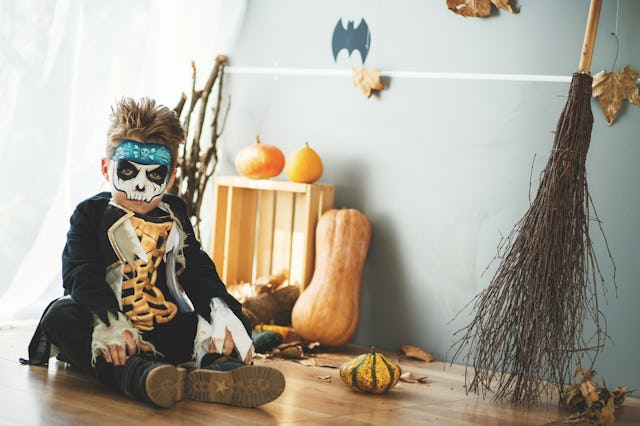So Your Kid Doesn't Want To Trick-Or-Treat... Now What?
A mental health expert offers tips on what to do when your kiddo is all dressed up... with nowhere (they want) to go.

For some kids, Halloween is among the most exciting days of the year. It can be easy to forget, though, that trick-or-treating can be really scary for kids of any age: going out in the dark, being surrounded by strangers in costumes, hearing abrupt loud noises, and seeing spooky lights and decorations is a lot, especially for sensitive kids.
There might be other reasons your kiddo doesn't want to trick-or-treat, too. Maybe they have sensory or mobility concerns, or maybe they're worried about the social aspect of it all. So, how can you make the holiday fun without forcing your little one into something they're not comfortable with? A social worker is here to help you navigate this, err, trick-y situation.
Before the Big Day
You know your kid best, reminds Jillian Amodio, a social worker, author, and the founder of Moms For Mental Health. "Follow their lead. Has your child been excited about Halloween, thrilled about decor, and excitedly engaging in festive events? Or have they been reserved, expressing fear, or showing signs of anxiety? If your child has been excited leading up to Halloween and seemingly out of nowhere decides they no longer want to trick-or-treat, I would suggest digging a bit deeper to look at the root cause."
Having a gentle, nonjudgmental conversation might help give some clarity. Some questions you can ask, per Amodio:
- Did something happen that was scary?
- Did someone say something that made them feel a certain way?
- Was there a falling out in a friend group that caused tension, and now they have no one to go with?
- Are they worried about the dark?
- Are they afraid of what they might see?
- Did someone say something about their costume?
- Are they second-guessing their costume?
Removing the Fear Factor
No matter the reason, if your child doesn't want to trick-or-treat (or wants to come home once they're already out), "parents and caregivers should never force a child into doing something they are not comfortable with," says Amodio. Your kid looks to you as a safe haven, and they won't feel that from you if you're pressuring them into something they hate.
Skipping out on spooky festivities doesn't mean there isn't plenty of Halloween fun to be had, notes Amodio. "Attending daytime trick-or-treat events like the ones often held at local libraries, shopping centers, or malls might take away some of the uncertainty that can come with trick or treating in the dark and later into the night," she says.
If they're afraid of what they might see, Amodio recommends having an age-appropriate conversation to help prepare them. You could even try a practice run at the house of a trusted neighbor, family member, or friend so they can see if it's not so scary. Either way, let them know what to expect and reiterate that you will stay right by their side if they like (or give them all the info they'll need if you're staying close by instead). Map out your route and go before dusk, taking breaks or keeping things short if necessary. "If a specific house is too scary, you can skip it," suggests Amodio.
Another solid tip: Stay attuned to their sensory needs, which might mean bringing an alternate outfit if they start to feel uncomfortable in their costume or perhaps dropping off "safe" foods or fun non-food items that neighborhood friends will know to give them upon their arrival to minimize their stress. Also, it should go without saying, but bringing water or juice is always a good idea.
"If a child is concerned that they are 'aging out' of trick-or-treating, or if they're experiencing peer struggles, or loneliness, finding events like trunk-or-treats and activities geared specifically toward pre-teens and teens can be beneficial," suggests Amodio.
All Treats, No Tricks
When discussing it with them, "honor and validate your child's emotions," says Amodio. If they are feeling scared, anxious, or uncertain, don't tell them there is no reason to be afraid. Their fears or concerns are real and valid. Talk with them about what is bothering them."
She adds, "Let them know that there is no wrong decision. No one will be mad if they do not go, but that you are there to help them work through their emotions and concerns if they still want to give trick-or-treating a try. If they do decide that trick or treating is too much for them, or if it's not an option (due to illness/injury, peer struggles, high anxiety, etc.), consider creating fun ways of celebrating together as a family inside or outside of the home."
Amodio's recs:
- Drive around the neighborhood to enjoy the festivities from a spectator position.
- Watch age-appropriate Halloween movies.
- Enjoy a festive craft project, such as painting or carving a pumpkin.
- Make Halloween-themed desserts or snacks. Have a family game night in costume.
- Hand out candy from your own home to see everyone else's costumes.
- Go out to dinner to avoid the frequent doorbell rings.
- Invite trusted loved ones over and have them hand out candy in separate rooms so your little one can still trick-or-treat without leaving the house.
No matter the game plan, sometimes it's necessary to remove the spooky from this season. And that's totally OK! As always, your little pumpkin's safety and well-being is of utmost importance, on Halloween and beyond.